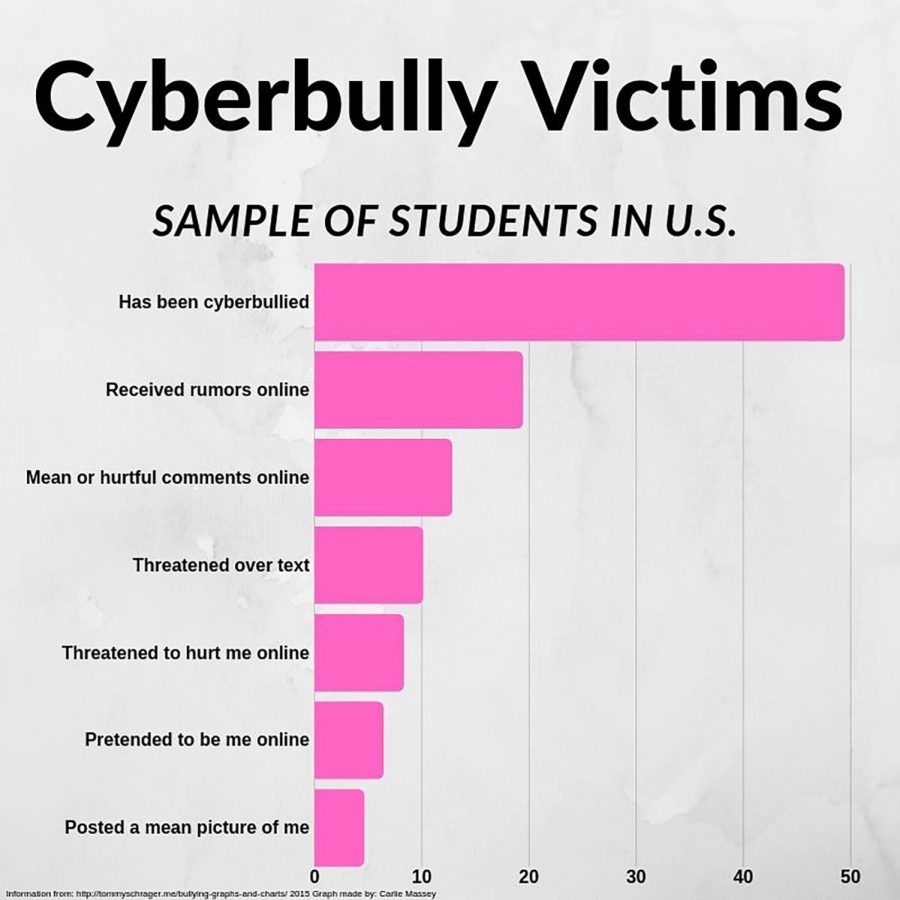Cyberbullying in the 21st century
How does cyber bullying effect its victims?
Cyber bullying is when communication through social media or text messages are used to bully a specific person. This is usually done through sending intimidating or threatening messages. Bullying has long term effects on its victims and is an epidemic that needs to be stopped.
When being cyber bullied at any age, feelings of being overwhelmed are common. According to stopbullying.gov, kids who are bullied online and through social media often times are more likely to be depressed and prone to feel emotions of loneliness and persistent sadness. When being bullied, teenagers tend to distance themselves from their family, friends, and school. Their grades tend to drop, their interest in school fades away. Participation in school activities decrease. They are likely to skip school or drop out completely. Eventually, victims will begin to believe their bully’s words. It has been recorded that they will feel exposed, humiliated, and eventually their walls will break down. According to verywellfamily.com the victim will feel angry, disinterested with their life, isolated, anxious and – in some cases – suicidal.
According to a study done by APA PsycNET in 2014, being cyberbullied is correlated to anxiety, depression, substance abuse, sleeping problems, and physical symptoms such as being sick or lethargic. Until recently, there was little research on the direct correlation of cyber bullying to increased suicide rates. However, in 2017, the Journal of Health Economics studied this link. This study discovered that cyber bullying increases suicide attempts by 8.7% and increases suicidal thoughts by 15%.
Verywellfamily.com states that 64% of victims who are cyber bullied know who their perpetrator is. 32% of people said someone online commented aggressive or mean things about them. 14% of people have been threatened by those who have made an aggressive comment about them. Cyber bullying can occur in many different forms; this can occur through sending threatening text messages or spreading unkind rumors through social media. It can also happen through ‘false friendship.’ This means that a bully will pretend to be friends with their victims in order to gain personal information or pictures that will eventually lead to the victim’s embarrassment.
According to bullyingstatistics.org, fewer than one in five victims of cyber bullying report it to the police. One in ten teenagers report having embarrassing pictures taken of them without consent. Only one in ten teens tell a parent if they are being or have been cyber bullied. Over one in three adolescents have been threatened through social media. Over 25% of teenagers have been or are being bullied through their phones.
Cyber bullying does not stop with high school and middle school. It continues on into college. A study done by the journal Procedia – social and behavioral sciences in 2010 showed that out of 439 students, 22% of students were still being cyber bullied. 38% of the students knew someone who had been a victim of cyber bullying, and 9% of college students admitted that they had cyber bullied someone.
This leads us to ask why cyberbullies act the way they do. Cyberbullies tend to be motivated by revenge. When a child or teenager is being bullied, their response can either be to cope with their feelings and seek help – or it can be to seek revenge against anyone and anything. These type of bullies are called ‘bully-victims.’ Bully victims feel like their actions can be justified because of their own experience of being tormented. By cyber bullying, they feel relief in their own life – if only temporarily.
Cyberbullies also feel like their victim is deserving of the harassment. For example, the popular kid at school may cyberbully the unpopular kid in order to make their social status known.
Whatever the circumstances might be, cyberbullies feel their words are justified and deserved. Because of this, they feel no remorse for what they have done. This leads us to discover that cyberbullies often times lack empathy. Cyberbullies do not see the pain they cause, due to the fact that it does not occur face to face, thus, they feel little to no remorse. Instead, they feel powerful and better about themselves. Cyberbullies also have a hunger for power. Cyber bullying give them this feeling of power. Those who are popular tend to make fun of the unpopular, leading the bully to feel better and mighty.
Stopbullying.gov states that bullies are more likely to abuse alcohol as well as other drugs. They will get into fights, vandalize, and even drop out of school. In some cases, they will engage in early sexual activity, and are abusive towards their partners and children if they have any.
Lastly, cyberbullies do not think they will get caught. The thing about cyber bullying is that it can happen anonymously and it gives them a sense of security. And most victims are too afraid to confront their bully, or bring it to an adult, leading the bully to have even more power over their victim.
Bullying in any form can have dangerous effects on the victim, those surrounding the victim, and even the bully. Cyber bullying is extremely dangerous due to its anonymous nature and the ability to delete anything that could be evidence. If you are being bullied in any form, tell an adult immediately. You are not alone, and help is a conversation away.


